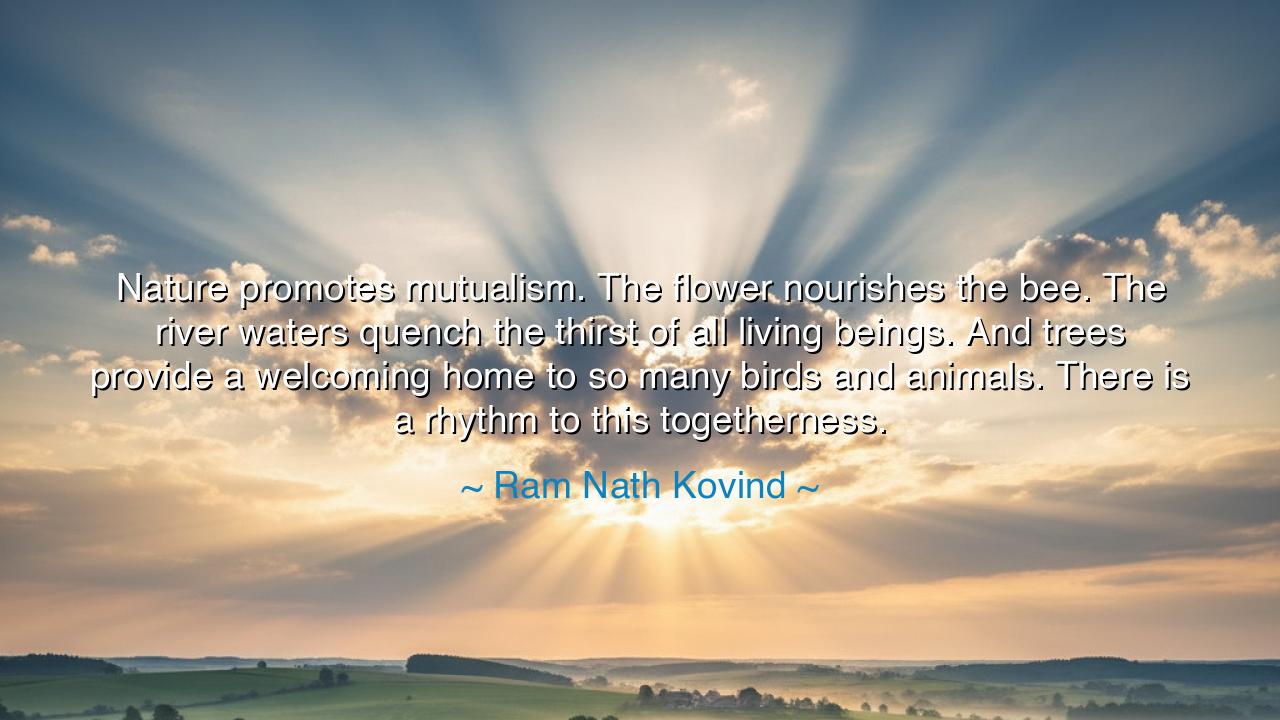
Nature promotes mutualism. The flower nourishes the bee. The
Nature promotes mutualism. The flower nourishes the bee. The river waters quench the thirst of all living beings. And trees provide a welcoming home to so many birds and animals. There is a rhythm to this togetherness.






“Nature promotes mutualism. The flower nourishes the bee. The river waters quench the thirst of all living beings. And trees provide a welcoming home to so many birds and animals. There is a rhythm to this togetherness.” Thus spoke Ram Nath Kovind, the 14th President of India — words soft as the breeze, yet heavy with the wisdom of ages. His saying is not merely an observation of the natural world; it is a philosophy of harmony, an ancient truth dressed in the language of compassion. In these lines, he reminds us that life thrives through balance, not domination; through mutualism, not isolation. Nature does not exist in fragments — it breathes as a whole, and all who live within it are bound by the same pulse, the same sacred rhythm.
The origin of this wisdom lies deep in the spiritual traditions of India, where the universe has long been seen as a single, living organism. The Vedas and Upanishads spoke of the interconnectedness of all beings, teaching that “all that lives is one family.” The sages saw in the bee and the flower, in the river and the sky, a mirror of divine cooperation. When Ram Nath Kovind uttered these words, he was not merely reflecting modern ecological thought; he was echoing an ancient chorus — a hymn of gratitude to the living earth. In that vision, man is not master, but participant — a humble strand in the web of togetherness that sustains creation.
To say that “Nature promotes mutualism” is to recognize that life is not a battle for survival, but a symphony of giving and receiving. The flower offers nectar, and the bee repays it by carrying the pollen onward. The river, which quenches the thirst of beasts and men, is replenished by the clouds that it once helped form through evaporation. The trees provide shade and shelter to countless creatures, and in return, the birds spread their seeds, ensuring the forest’s renewal. Every act of giving sustains another act of life — and this endless cycle is the song of existence itself. This is the “rhythm of togetherness” that Kovind speaks of: a melody older than time, played by every living thing that has ever drawn breath.
Yet humanity, in its pride, too often forgets this rhythm. We build without balance, consume without thought, and take without giving. In doing so, we break the very harmony that sustains us. The ancients warned that when man grows deaf to nature’s song, chaos follows — famine, flood, disease, and despair. Consider the story of the Indus Valley Civilization, which flourished for centuries along mighty rivers. When the rivers changed course and the forests thinned, the people could not adapt; their cities fell silent. Nature, which had once nourished them, withdrew her favor. This is the lesson of every fallen empire: the earth is generous, but she does not suffer neglect.
But Kovind’s words are not a warning alone — they are an invitation. He calls us to remember that to live well is to live with, not against. We must rediscover the art of mutualism in our own lives. Just as the bee and flower sustain one another, so too must human beings learn to coexist — nation with nation, community with community, person with person. Cooperation, kindness, and empathy are not signs of weakness; they are the laws of nature itself. In every forest, in every stream, the lesson is the same: life endures only where there is balance.
Look to the story of Amrita Devi Bishnoi, who in the 18th century gave her life to protect the trees of her village from being cut down. When the king’s men came to fell them for wood, she and hundreds of her people embraced the trunks and refused to move. “A chopped head is cheaper than a felled tree,” she said before she died. Her sacrifice birthed a movement of reverence for nature that still echoes in India today — a testament that true mutualism demands not comfort, but courage.
The lesson of Kovind’s words, then, is timeless and clear: we must once again align our hearts with the rhythm of the world. To live in harmony with nature is not to renounce progress, but to pursue it wisely — to take only what we need and to give more than we take. Begin small: plant a tree, save water, protect the creatures that share your world, and above all, live gently. For every act of respect you offer the earth, the earth returns a blessing.
Let this be our creed: to live as the rivers flow, as the flowers bloom, as the bees labor — in mutual service, in balance, in togetherness. For as long as we honor the rhythm that sustains us, the song of life will continue to play. But should we forget it, even for a moment, the music will falter, and silence — deep and sorrowful — will fall upon the world. Thus, as Ram Nath Kovind reminds us, the key to peace lies not in conquering nature, but in learning again to dance to her eternal rhythm — the rhythm of togetherness.






AAdministratorAdministrator
Welcome, honored guests. Please leave a comment, we will respond soon